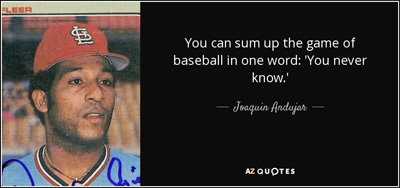Republicans could learn a lot from just-deceased baseball legend Yogi Berra, like “when you come to a fork in the road, take it.” They seem to find most forks in the road befuddling and reason for impasse, rather than making clear decisions.
But a few weeks prior to the demise of Berra, another quotable ballplayer–former St. Louis Cardinal Joaquin Andujar–died as well. Perhaps Andujar’s most famous quote was when he was asked by a reporter to describe the nature of baseball. Andujar responded: “You can sum it up in one word–you-never-know.’” When you think about it, that’s a great three-word description of baseball. The more you drill down into the intricacies of the game, the more you seen things that never occurred before. Withina single game, obvious predictions repeatedly prove wrong, and the wise fan can only conclude about baseball, “You never know.”
What makes baseball unpredictable is that the empirical evidence is always changing. That’s kind of like the real world. If we use this axiom in the political world, we know that Democrats deal with new information much better than Republicans do. This is not just an impression; it is based on evidence from scientists studying “The Republican Brain.” We also know that Republicans tend to be surer of their positions; less willing to thoughtfully consider the possibility that they might be wrong.
Of course, if logic prevailed, baseball players and others close to the game such as reporters would subscribe to the “you-never-know” theory and apply it to politics as well as other dimensions of life. However, it seems that many baseball aficionados compartmentalize things in their lives, another characteristic of the Republican brain. They apply different rules to politics than to baseball. While those close to baseball embrace the unpredictability of their game, the same people often have difficulty applying that principle to other areas of life. The little evidence we have about the politics of baseball players is that many of them (at least the white players) tend to identify with Republicans. A couple of them have been elected to Congress in their post-baseball years. Wilmer “Vinegar Bend” Mizell was elected to Congress from North Carolina’s 5th District as a Republican in 1968. His election was part of the beginning of the new tide of Republican domination of the South, following the successes of President Lyndon Johnson and progressive Democrats in passing new federal civil rights legislation.
Former pitcher Jim Bunning served in the U.S. House of Representatives from 1987-1999 as a Republican from Kentucky. Next he served twelve years as a Republican senator from the Bluegrass State. A glance at other professional athletes who have served in Congress since 1936 shows that most have been Republicans. Sports like football and basketball also live under the “you-never-know” axiom, though perhaps not as much as baseball.
It would be helpful if professional athletes could apply the “you-never-know” principle to dimensions of life outside of their sport, specifically the unpredictability. Some scientific phenomena, like the force of gravity when a brick falls off a building, are predictable. But others, like the role of gravity in predicting tomorrow’s weather, are much more complex and require a measure of humility from all who engage in predictions. It’s sad that so many people who say that baseball reflects life really don’t follow that to its logical conclusion: be cautious about being certain with regard to most things. Politics, and ultimately our society would be better served if more people in power, both Republicans and Democrats, would be cautious in moving towards locked positions. Like baseball, life is complicated.
